Our Towns: Ellwood City rounds the bases honoring Hack Wilson legacy
Editor's Note: Our Towns is a series looking at the people and places that are part of the communities of Beaver County, many of which often don't get a lot of attention from those outside their borders. It's a place for unheard voices and surprises about the county we share.
With ballcaps doffed, the spectators packed into two bleachers stand attentively as the Lincoln High School Blue Band performs "The Star-Spangled Banner." It's an overcast and warm late-August day, perfect for baseball, or in this particular case to gather at the Lincoln High Sports Complex in Ellwood City to celebrate an overlooked, misunderstood Hall of Famer. who set a Major League Baseball record that's stood for 93 years. Ladies and gentlemen, welcome to the unveiling of Pennsylvania's 2,567th roadside historical marker honoring Lewis Robert "Hack" Wilson, a hometown, home run hero who at 5-foot-6 overcame vast odds to become one of the titans of his era.
ELLWOOD CITY ― One by one they took their turn at bat Aug. 25. The mayor, a state legislator, local historical society officials and an esteemed baseball researcher stood at the podium on the grass outside the Lincoln High baseball field describing the feats of Hack Wilson.
Those distinguished speakers used praiseful words like "slugging machine" and "one of the greatest power hitters" and "the National League version of Babe Ruth" to characterize Wilson, who was born in Ellwood City on April 26, 1900, learning to play baseball on a field next to the Shelby Tube Mill, and making his pro baseball debut in 1921.
Our Towns collection Our Towns: Tales from our communities
Wilson's 12-year Major League baseball career included tenures with the New York Giants, Brooklyn Dodgers, Philadelphia Phillies and most notably the Chicago Cubs, for whom his 1930 season is remembered as one of the greatest individual single-season performances in baseball history. Wilson clubbed 56 home runs that year, setting a National League record that lasted for 68 years, while driving in 191 runs, a feat that remains unmatched. In 1934, the four-time homerun champ made his final Major League appearance. It would be 45 years later in 1979 − 31 years after his death − before the Baseball Hall of Fame enshrined him.
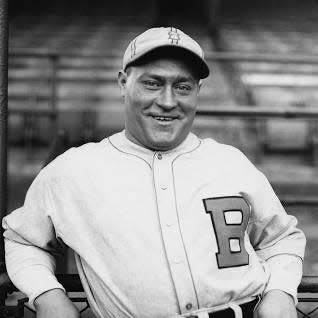
Years ago, borough officials adopted the name Hack Wilson Drive for an undistinguished causeway leading to the 69-acre Steifel Park in the southern hills of Ellwood City, which includes the softball field where the Lincoln High School softball team has competed. During Wilson's early 1900s upbringing in Ellwood City, that area was owned by neighboring North Sewickley Township and nicknamed the Brickyard, home to Clydesdale Quarries, where limestone, sand, coal and clay were mined, and bricks were made in kilns, according to the borough's Facebook page. The Brickyard closed during the Great Depression, and in 1942, Ellwood City purchased the property to create a park.
While the Hack Wilson Drive name was one way to honor a native son, you could sense among eyewitnesses an extra measure of long overdue recognition being appreciated in Ellwood City as the 50-minute historical marker ceremony culminated along Woodside Avenue with a tarp removed to unveil the blue road sign with 76 yellow words outlining the historical significance of Wilson.
Steve Handlos had pre-arranged a long lunch break from his job at Ellwood City Forge to walk over to the ballfield to take in the ceremony.
"I'm a lifetime baseball fan and I've gone to the Baseball Hall of Fame a number of times," Handlos, wearing a Brooklyn Dodgers cap like Wilson did in the 1932-34 seasons, said. "I've always been a big fan of Hack Wilson because of the fact he was born here."
Wilson's legacy put Ellwood City on the map for London, Ontario, resident David Ormandy, a Pittsburgh Pirates fan who timed a PNC Park home game visit with a chance to see the Wilson ceremony.
"I'm just wearing this for Hack," Ormandy said in reference to his Cubs hat and blue shirt. "Generally, I wear black, white and gold wherever I go. To be honest, the only time I have ever heard of Ellwood City was knowing Hack Wilson was born here, so I looked into it and found it's 45 minutes from where I'm staying, I wanted to come see this."
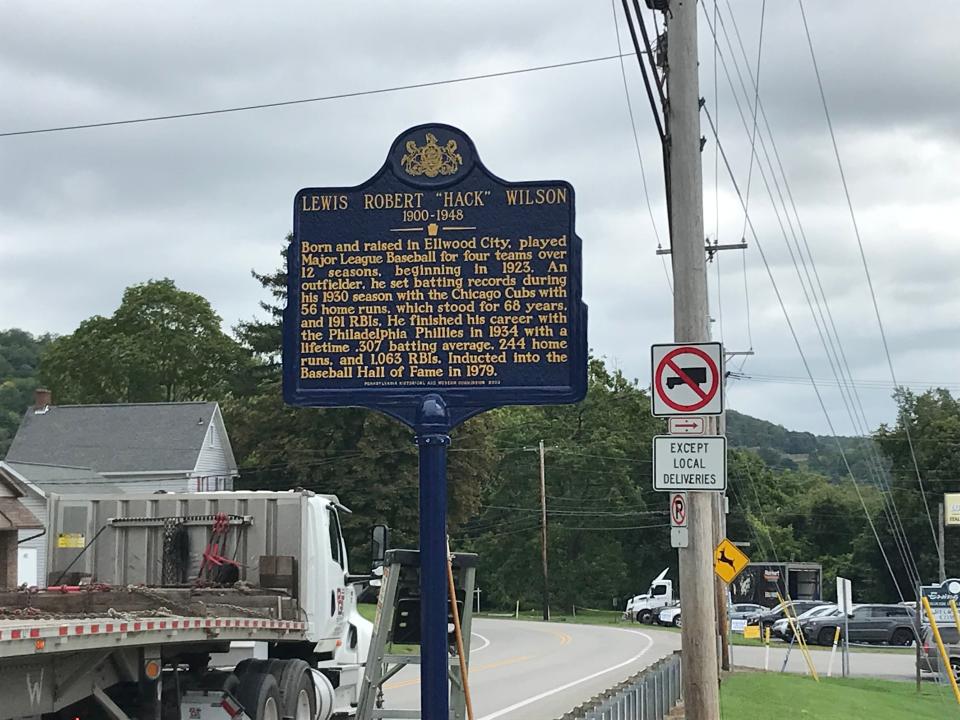
A year ago, he took a six-and-a-half hour trip to Donora, Pa., to attend a similar dedication for a plaque honoring St. Louis Cardinals hall-of-famer Stan Musial.
"I just was looking forward to another event like this and thought it was very, very enjoyable," Ormandy said. "Hack was quite the colorful character."
The historical ceremony's special guest, John Racanelli from the Society of Baseball Research, shared some of those more colorful stories, like the time Wilson jumped through a window to dodge a Chicago speakeasy raid, and a 1928 brawl Wilson got involved in after being heckled by a Wrigley Field spectator. The loudmouthed fan whom Wilson struck filed a $20,000 lawsuit, but a courtroom jury sided with Wilson.
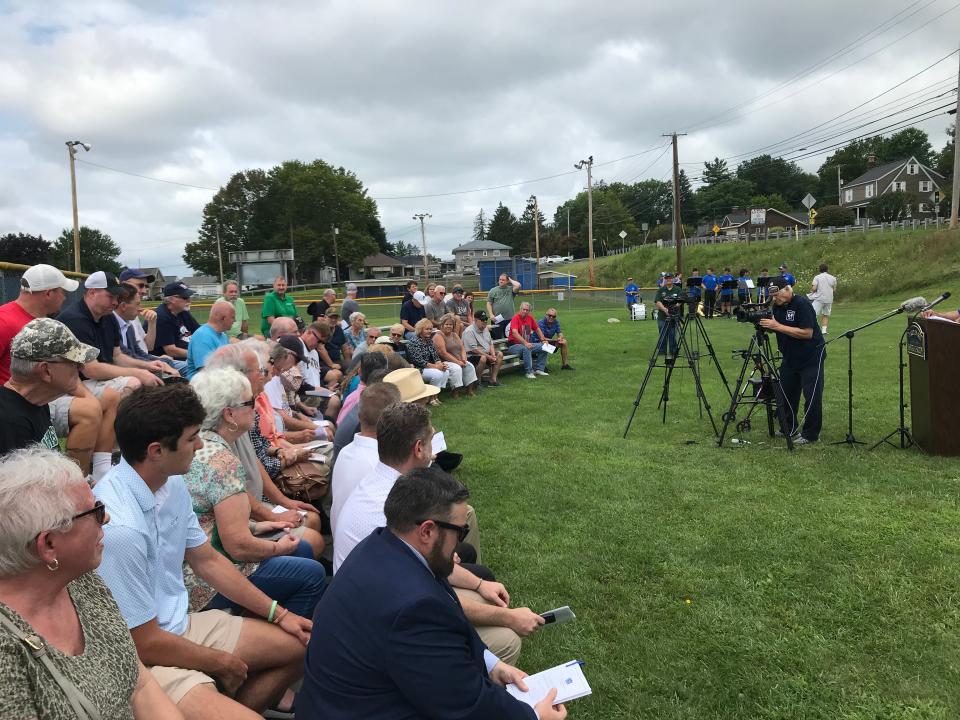
Sports reporters chronicled and speculated on Wilson's heavy drinking, epitomized by a Washington Post writer who came up with an enduring description of Wilson being someone "built along the lines of a beer keg, and was not wholly unfamiliar with its contents."
Born to alcoholic parents who never married, historians believe Wilson's physical appearance − large head, stout torso and small legs and feet (a size 5-1/2 shoe) − along with personality disorders such as a penchant for poor judgment, suggest evidence of Fetal Alcohol Syndrome.
Hack's mom, Jennie Kaughn, was a 17-year-old Philadelphia street kid; the dad was 24-year old steelworker Robert Wilson. Jennie died from appendicitis complications when Hack was just 7. For several years, the father abandoned Hack, who was raised on Crescent Avenue in Ellwood City in a boarding house run by a woman known as Grandma Wardman whose own son, Connie, mentored Hack and taught him the sport of baseball.
"Hack was a mascot for the Industrial League teams that Connie Wardman played on," Bob Morabito, president of the Ellwood City Area Historical Society, said. "Hack reportedly would practice catching, throwing and hitting with the adults. There was no Little League program back then, so he only played in pick-up games with mostly older local children. The baseball fields that the adults played on at the time were located near Second Street, where Adams Manufacturing and the Forge Bloom plants are located today."
Hack was 10 when his dad reclaimed him, and whisked him away to Chester, Pa., a tough town south of Philadelphia.
Ellwood City residents take pride that Wilson learned the game of baseball in their hometown.
"It's an awesome story what he did, setting a record that may never be broken," said 10th grader Lucas Bleakney, an Eagle Scout, who wore his Lincoln High Wolverines baseball uniform when given the honor of pulling aside the plastic covering to unveil publicly the Hack Wilson historical sign. "It's cool to have someone from where you were born do that."
Racinelli, the world's leading collector of Hank Wilson baseball cards, said, "Though his tenure in baseball was relatively short, Hack Wilson made an imprint on the game that resonates to this day."
After his record-setting 1930 season, Wilson gained 20 pounds in the offseason and got mired in a batting slump in 1931 but rebounded in 1932 after being traded to the Brooklyn Dodgers, finishing with an impressive .297 batting average with 23 home runs and 123 Runs Batted In (RBIs). Fans cheered on his hitting prowess and smiled at his pugnacious reputation, but when his batting average and home run totals diminished in 1933-34, the Dodgers released Wilson, who then attempted a brief but unsuccessful comeback with the Philadelphia Phillies.
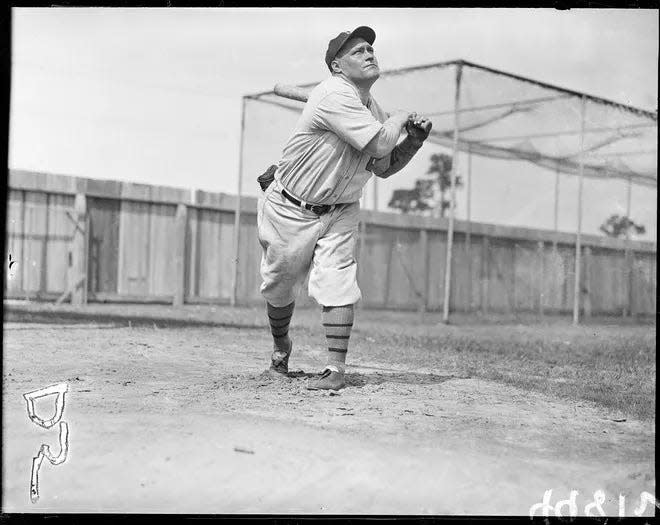
After a final season of minor league ball with Albany in the New York-Pennsylvania League, Wilson retired at age 35 and moved back to Martinsburg, W.Va., where he had begun his minor league career in 1921. He bounced around from Brooklyn to Baltimore and died two days before Thanksgiving 1948 from internal bleeding believed to be caused by pneumonia and other complications, suffered a month earlier when he was found unconscious after a fall in his home.
Wilson was 48 at his death, and almost penniless. Donations tossed into a hat passed around a bar saved him from a pauper's grave, Racanelli said.
It's a sad ending, though Racanelli and Ellwood City Area Historical Society officials find a positive element from a notable quote Wilson gave a week before his death during a national CBS Radio interview later reprinted in Chicago newspapers.
Feeling philosophical about his career trajectory, Wilson told his interviewer, "Talent isn't enough. You need common sense and good advice. If anyone tries to tell you different, tell them the story of Hack Wilson. ... Kids in and out of baseball who think because they have talent, they have the world by the tail. It isn't so. Kids, don't be too big to accept advice. Don't let what happened to me happen to you."
Fans like Ormandy know that 75 years later, a framed copy of that quote still hangs in Chicago's Wrigley Field clubhouse, as a cautionary reminder and heartfelt lesson.
A lesson from which coaches and teachers can continue to draw.
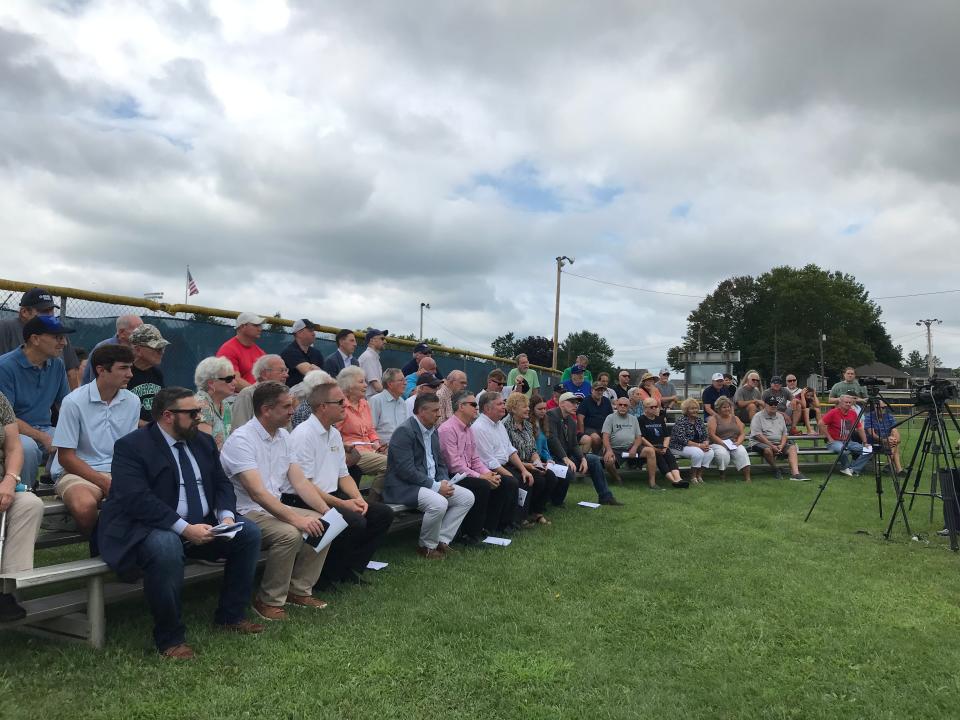
Ellwood City Area Historical Society President Morabito said because of Wilson's undisciplined habits, "his life is a cautionary tale of an individual with tremendous talent who allowed his drinking and brawling to dull the even greater impact he could have had on professional baseball and ultimately led to an ignominious end. We recognize Hack Wilson's accomplishments and value his gained wisdom by our celebration. We sincerely hope the marker will inspire future generations to learn the story of Hack Wilson and recognize that hard work, perseverance, and self-discipline will trump talent every time."
Getting the sign approved and installed took a two-year effort that began in September 2021, when the ECAHS' then-president Everett Bleakney was asked if Ellwood City had any kind of marker recognizing Hall-of-Famer Wilson.
"We could only answer that the entrance to Stiefel Park was named after him," Morabito said. "Everett was in contact with Richard C. Saylor who is with the Pennsylvania Historical and Museum Commission. Rich outlined the process to get a historical marker in Hack's honor. Everett brought it to the Board who unanimously agreed that Hack was an appropriate subject for such recognition and the application for the marker to the Pennsylvania Historical and Museum Commission was started."
The effort reached home plate on Aug. 25, with a ceremony that drew community-minded people like Ellwood City School Board member Jean Biehls, a retired music educator.
"I learned a lot of history of somebody that was from here and what they did in their life," Biehls, who moved to Ellwood City in 2015, said.
She believes the historical sign will help future generations appreciate and learn from Wilson.
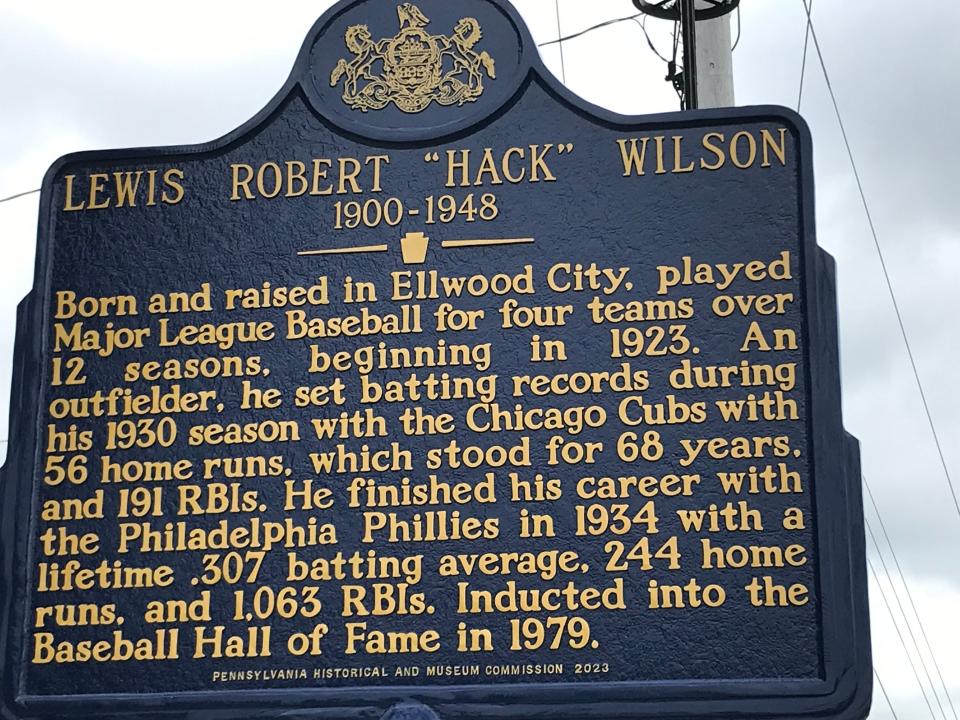
"He had challenges that he met," Biehls said. "This definitely makes me feel proud. Western Pennsylvania proud. Ellwood City proud. Sometimes we have local people that have done wonderful things that are overlooked and forgotten. I think this is an example of bringing forth to everyone in the community and the county what this person did in their life."
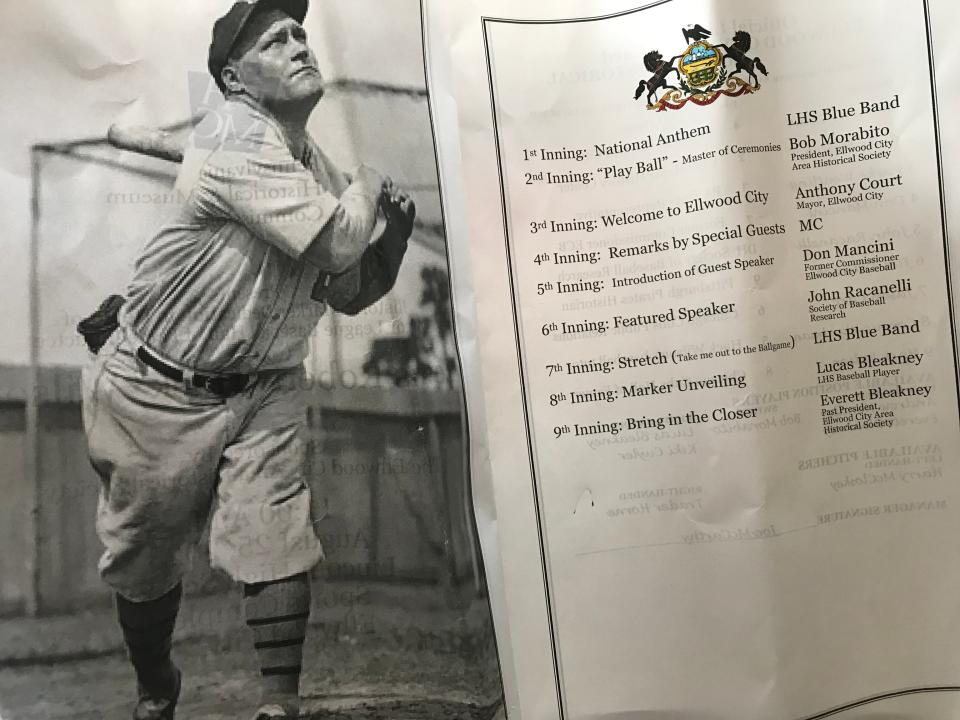
At the conclusion of the Aug. 25 ceremony, many attendees climbed the hill from the Lincoln High baseball field to the roadside marker on Woodside Avenue (State Route 65) to snap a photo of the sign for posterity.
"This event was wonderful; I learned things," said Raymond Santillo, former executive director of the Ellwood City Area Chamber of Commerce and a principal and coach for 35 years in the Riverside School District. "We love history here in Ellwood City and this story is very, very, very special."
Facts about Hack Wilson
Born in Ellwood City in 1900, Lewis R. "Hack" Wilson played Major League Baseball for 12 seasons, finishing with a .307 batting average, 244 homeruns and 1,063 RBIs. His 1930 season with the Chicago Clubs saw him hit 56 homeruns, along with driving in 191 runs, an RBI total that remains the all-time major league single-season record. Wilson died in 1948 and was enshrined in the Baseball Hall of Fame in 1979. Ellwood City named a street after him, and this past summer dedicated a state historical marker proclaiming his accomplishments, erected near the Lincoln High School baseball field.
More: Take the escape room challenge aboard a WWII submarine at Carnegie Science Center
More: Underground Railroad Walking Tour with guest speakers event set for New Brighton
Scott Tady is entertainment editor at The Beaver County Times and Ellwood City Ledger, and easy to reach at stady@gannett.com.
This article originally appeared on Beaver County Times: Our Towns: Ellwood City rounds the bases honoring Hack Wilson's legacy

